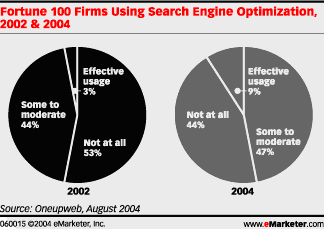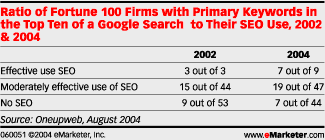Sourced from emarketer.com
Less than 10% of the Fortune 100 is effectively using search engine optimisation for their Web sites, according to a new study by Oneupweb.
Integrated search engine marketing firm Oneupweb analysed the main corporate sites of Fortune magazine’s top 100 companies to determine the level of effectiveness with which each company has used search engine optimisation (SEO).
The analysis indicates that the number of companies effectively using SEO is quite small – only nine of the 100 companies in the study. Oneupweb’s criteria for effective use is based on the practice of both “ethical” and “unethical” SEO methods. “Ethical” methods include pertinent keywords in tags and relevant titles and body text, whereas “unethical” methods include invisible text and image links, keyword tags not related to the business sector and other methods used to trick search engines.
Those deemed moderate SEO users by Oneupweb are those firms which employ too few optimisation techniques or use enough but employ them ineffectively. Moderate SEO users account for 47% of the Fortune 100. About the same percentage of companies, 44%, use no SEO at all. This is a slight change from a survey Oneupweb conducted in 2002, which found that over 50% of Fortune 100 companies did not use SEO at all, while 44% used some methods, and only 3% had effectively optimised their site for search.

Comparing the level of SEO to a company’s position in a search engine’s rankings, Oneupweb found that search engine optimisation paid off. Companies with effective SEO often end up in the top 10 search results on Google for their respective keywords. This year, 7 out of the 9 firms effectively using SEO had placement in the top 10 Google results presented for a search on their respective primary keywords. On the other hand, a lack of SEO efforts results in over 80% of those companies missing the Google top 10 list altogether.

Although there has been a general migration towards SEO, they were surprised that it hasn’t been adopted by more companies since 2002. Indeed, while the number of firms not using optimisation at all has dropped below 50%, analysts expected many more effectively-optimised sites in 2004 – as many as 30.
Although Fortune 100 companies often benefit from name recognition and a commanding position in their industry, poor site design can still result in lower search engine rankings. Conversely, competitors have an opportunity to take advantage of this sluggishness by making sure their SEO is top notch so that they can gain a higher profile in search results and thus among online customers at large.
